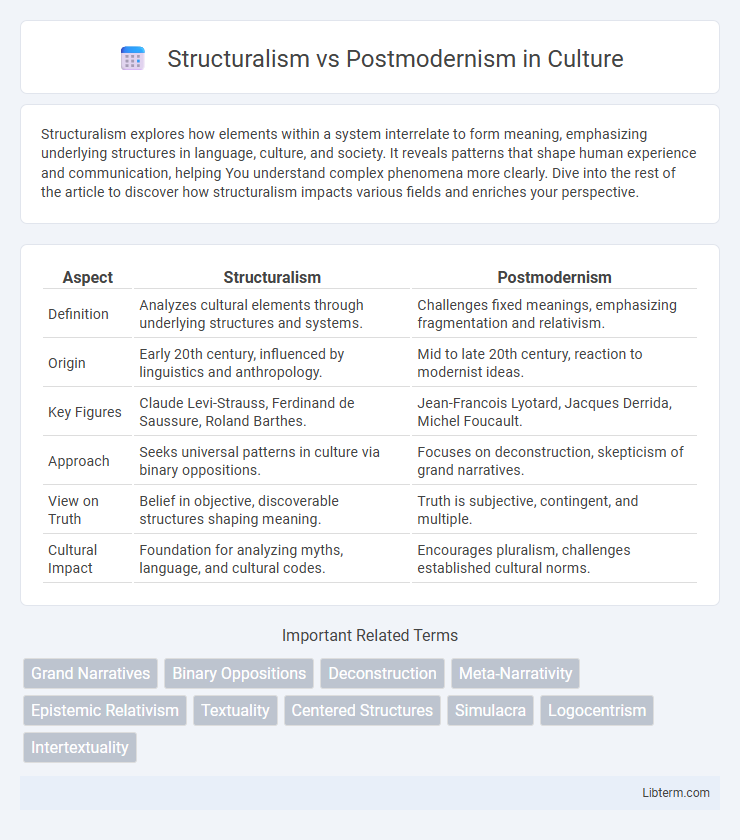Structuralism explores how elements within a system interrelate to form meaning, emphasizing underlying structures in language, culture, and society. It reveals patterns that shape human experience and communication, helping You understand complex phenomena more clearly. Dive into the rest of the article to discover how structuralism impacts various fields and enriches your perspective.
Table of Comparison
| Aspect | Structuralism | Postmodernism |
|---|---|---|
| Definition | Analyzes cultural elements through underlying structures and systems. | Challenges fixed meanings, emphasizing fragmentation and relativism. |
| Origin | Early 20th century, influenced by linguistics and anthropology. | Mid to late 20th century, reaction to modernist ideas. |
| Key Figures | Claude Levi-Strauss, Ferdinand de Saussure, Roland Barthes. | Jean-Francois Lyotard, Jacques Derrida, Michel Foucault. |
| Approach | Seeks universal patterns in culture via binary oppositions. | Focuses on deconstruction, skepticism of grand narratives. |
| View on Truth | Belief in objective, discoverable structures shaping meaning. | Truth is subjective, contingent, and multiple. |
| Cultural Impact | Foundation for analyzing myths, language, and cultural codes. | Encourages pluralism, challenges established cultural norms. |
Introduction to Structuralism and Postmodernism
Structuralism explores underlying systems that shape culture, language, and society through binary oppositions and deep structures within texts and social practices. Postmodernism challenges these fixed structures, emphasizing fragmentation, ambiguity, and the fluidity of meaning, rejecting universal narratives and objective truth claims. Seminal figures in Structuralism include Ferdinand de Saussure and Claude Levi-Strauss, while Postmodernism is shaped by thinkers like Jean-Francois Lyotard and Jacques Derrida.
Historical Contexts of Structuralism and Postmodernism
Structuralism emerged in the early 20th century, rooted in linguistic theories by Ferdinand de Saussure and influenced by developments in anthropology, psychology, and literature to analyze underlying structures in culture and language. Postmodernism arose in the mid-20th century as a reaction to modernist principles and structuralist frameworks, reflecting skepticism toward grand narratives and emphasizing relativism, fragmentation, and the instability of meaning. The historical context of postmodernism includes post-World War II disillusionment, the rise of consumer culture, and the rapid advancement of technology, which challenged established truths and encouraged diverse, decentralized perspectives.
Core Principles of Structuralism
Structuralism emphasizes the identification of underlying structures that govern cultural phenomena, language, and cognition, asserting that meaning emerges from the relationships between elements within a system. Key figures like Ferdinand de Saussure highlight binary oppositions and synchronic analysis, where language is viewed as a system of signs defined by differences. This approach seeks universal patterns and rules that shape human experience, contrasting with postmodernism's rejection of grand narratives and focus on fragmentation and plurality.
Key Features of Postmodernism
Postmodernism emphasizes skepticism toward grand narratives and universal truths, promoting pluralism and relativism in cultural and intellectual contexts. It challenges structuralist ideas by highlighting the instability of meaning and the complexities of language through processes like deconstruction. Key features include pastiche, irony, fragmentation, and a focus on power dynamics within discourse and representation.
Influential Thinkers in Structuralism and Postmodernism
Structuralism, led by thinkers such as Ferdinand de Saussure and Claude Levi-Strauss, emphasizes analyzing cultural phenomena through underlying structures, particularly language and myths. Postmodernism features influential figures like Jean-Francois Lyotard and Jacques Derrida, who challenge universal narratives and promote deconstruction of texts to reveal fragmented meanings. These thinkers redefine interpretation by shifting from fixed structures to fluid, contested realities that undermine traditional epistemologies.
Differences in Theoretical Approaches
Structuralism emphasizes underlying structures and universal patterns in culture, language, and society, seeking objective, systematic analysis through fixed codes and binary oppositions. Postmodernism rejects grand narratives and fixed meanings, promoting fluidity, ambiguity, and the deconstruction of established structures to highlight subjective interpretations and pluralism. While Structuralism aims to uncover stable frameworks, Postmodernism challenges the existence of any stable truth, emphasizing relativism and fragmented perspectives.
Impacts on Literature and Art
Structuralism's impact on literature and art emphasizes underlying systems and universal structures, analyzing texts and artworks as part of larger, coherent frameworks. Postmodernism challenges these fixed interpretations by embracing fragmentation, intertextuality, and subjective experience, promoting diverse and contradictory meanings. This shift has led to experimental narratives and eclectic aesthetics that question authority and celebrate multiplicity in cultural expressions.
Criticisms of Structuralism
Structuralism faces criticism for its rigid adherence to universal structures, often neglecting historical context and individual agency. Critics argue it oversimplifies cultural phenomena by reducing complex human experiences to binary oppositions and deterministic frameworks. Postmodernism challenges this by emphasizing fragmentation, plurality, and the instability of meaning in texts and social practices.
Critiques of Postmodernism
Postmodernism faces critiques for its skepticism towards objective truths, which structuralists argue undermines the search for universal meanings and stable structures in culture and language. Critics contend that postmodern relativism can lead to intellectual nihilism, weakening the analytical rigor necessary for understanding societal systems. Furthermore, postmodernism's focus on fragmented perspectives is seen as dismissive of overarching frameworks essential for coherent interpretation and critique.
Lasting Influence and Contemporary Relevance
Structuralism, emphasizing underlying systems and universal patterns in culture and language, laid the groundwork for disciplines such as linguistics, anthropology, and literary theory, shaping modern analytical frameworks. Postmodernism challenged these fixed structures by promoting plurality, skepticism toward meta-narratives, and the deconstruction of meaning, influencing contemporary art, philosophy, and critical theory. The lasting influence of Structuralism remains visible in formal methodologies, while Postmodernism's contemporary relevance is evident in its critique of authority and its embrace of fragmented perspectives in global culture.
Structuralism Infographic

 libterm.com
libterm.com